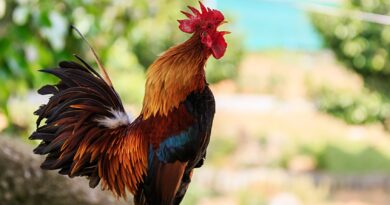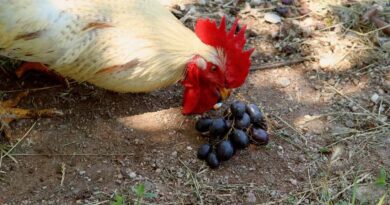Can Chickens Eat Celery? Benefits and Risks of Feeding Celery to Your Flock
Can Chickens Eat Celery? Benefits and Risks of Feeding Celery to Your Flock
As chicken owners, we want to provide our flocks with a balanced diet that promotes health and productivity. While chickens primarily eat grains and specially formulated poultry feed, it’s also important to offer them variety in the form of fruits, vegetables, and other healthy snacks. One common vegetable that raises questions is celery. Can chickens eat celery safely? And if so, what are the benefits and potential risks of feeding it to them?
In this article, we will answer these questions in detail, providing you with all the information you need to safely include celery in your chicken’s diet. From the nutritional value of celery to its possible benefits and precautions, you’ll learn everything about feeding celery to your flock.
What is Celery?
Celery (Apium graveolens) is a crunchy, green vegetable that is widely consumed around the world. It’s part of the Apiaceae family, which includes carrots, parsley, and fennel. Known for its mild flavor, high water content, and low calorie count, celery is often used in salads, soups, and snacks.
The vegetable is rich in fiber, vitamins, and minerals that offer various health benefits to humans. But when it comes to chickens, can they reap the same benefits from celery? Let’s explore that in more detail.
Can Chickens Eat Celery? The Answer is Yes!
Yes, chickens can eat celery. In fact, it can be a healthy and nutritious addition to their diet, provided it is fed in moderation. Like most vegetables, celery offers a variety of vitamins, minerals, and fiber that can contribute to your chickens’ overall health.
However, as with all treats, celery should not replace the chickens’ primary feed, which should be specially formulated to meet their nutritional needs. Treats, including celery, should only make up around 10% of their total daily diet.
Nutritional Value of Celery for Chickens
To understand why celery is a good treat for chickens, it’s essential to take a look at its nutritional composition. Celery contains the following key nutrients:
- Water: Celery is made up of about 95% water, making it an excellent hydrating snack for chickens, especially in hot weather.
- Vitamins: Celery contains vitamin K, which plays a crucial role in bone health and blood clotting. It also provides vitamins A, C, and some B-vitamins, which support the immune system and overall health.
- Minerals: It is rich in potassium, calcium, and magnesium, which are essential for heart health, muscle function, and bone strength.
- Fiber: Celery is high in fiber, which aids in digestion and can help maintain a healthy gut for your chickens.
- Antioxidants: Celery contains antioxidants like flavonoids that help reduce inflammation and fight free radicals in the body.
When fed in appropriate portions, celery can contribute positively to your chickens’ nutrition, offering hydration, fiber, and essential vitamins and minerals.
Benefits of Feeding Celery to Your Chickens
Now that we know chickens can safely eat celery, let’s look at the specific benefits it can provide to your flock.
1. Hydration
Celery is about 95% water, making it an excellent source of hydration for your chickens. This is particularly beneficial during the hot summer months or if your chickens have limited access to fresh water. The high water content can help keep them hydrated and reduce the chances of dehydration, which can lead to health problems and reduced egg production.
2. Promotes Healthy Digestion
The fiber content in celery helps promote healthy digestion in chickens. Fiber supports the movement of food through the digestive tract and can prevent constipation. Additionally, it can improve gut health by promoting the growth of beneficial bacteria in the digestive system.
3. Rich in Vitamins and Minerals
Celery is rich in vitamins A, C, and K, as well as essential minerals like potassium and calcium. Vitamin A supports the immune system, while vitamin C acts as an antioxidant, helping chickens fight off infections and illnesses. Vitamin K is important for blood clotting and bone health, and potassium and calcium are vital for heart health and muscle function.
4. Low in Calories
Celery is a low-calorie vegetable, making it a healthy treat option for chickens. This can be especially beneficial for adult chickens that may need to maintain a healthy weight. Since it’s low in fat and calories, you don’t have to worry about overfeeding celery and causing your chickens to become overweight.
5. Enriches Their Diet
Chickens love variety, and feeding them a wide range of treats, including celery, adds interest to their diet. The crunchiness of celery also provides mental stimulation, which can prevent boredom and encourage foraging behavior. A varied diet also ensures that chickens get a broad range of nutrients, supporting overall health and vitality.
How to Feed Celery to Your Chickens
While celery is generally safe for chickens, it’s important to feed it properly to ensure that your flock can enjoy it safely.
1. Chop or Slice Celery
Chickens can struggle with eating large, whole celery stalks, so it’s best to chop or slice the celery into smaller, manageable pieces. You can cut it into 2-3 inch sections or slice it into smaller bits depending on the size of your chickens. This makes it easier for them to eat and reduces the risk of choking.
2. Offer it Fresh
Fresh celery is the best option for chickens. Avoid giving them celery that has been left out for too long or has wilted. Wilted or spoiled celery can lead to digestive issues and may not provide the same level of nutrients as fresh celery.
3. Mix it with Other Treats
You can mix celery with other vegetables or fruits as part of a treat variety. Chickens love to peck at different textures and flavors, so mixing celery with leafy greens, carrots, or apples can keep things exciting and provide more nutrients.
4. Avoid Overfeeding
Celery should be offered in moderation. While it’s healthy, it should not replace their regular poultry feed, which is specially formulated to meet their nutritional requirements. Overfeeding celery or any treat can result in nutritional imbalances, which could affect egg production and overall health.
Risks of Feeding Celery to Your Chickens
Although celery is generally safe for chickens, there are some risks to be aware of when feeding it to your flock.
1. Pesticides and Chemicals
Like many vegetables, celery can contain pesticides or chemicals used during farming. To avoid this, it’s important to wash celery thoroughly before offering it to your chickens. Alternatively, you can choose organic celery to minimize the risk of exposure to harmful chemicals.
2. Choking Hazard
While celery is generally safe, large pieces or tough stalks could pose a choking hazard, especially for smaller chickens or chicks. Always cut celery into small, manageable pieces to avoid the risk of choking.
3. Overfeeding
Although celery is healthy, it’s important not to overfeed it. Chickens should have a balanced diet with their main poultry feed providing the necessary nutrients. Celery should only be offered as a treat, and no more than 10% of their daily intake should come from snacks like celery.
4. Gastrointestinal Upset
Feeding too much celery or any new food suddenly can upset your chickens’ digestive system. Introduce celery gradually to avoid gastrointestinal issues like diarrhea or bloating. Monitor your chickens closely after offering any new food to see how they respond.
How Often Can You Feed Celery to Your Chickens?
Celery can be given to your chickens several times a week, but it’s important to offer it in moderation. Since celery is a treat and not a complete source of nutrition, it should make up no more than 10% of their total daily diet. This ensures that they are getting a balanced diet while still enjoying the benefits of this vegetable.
Conclusion: Is Celery a Good Treat for Chickens?
In conclusion, celery is a safe, healthy, and nutritious treat that chickens can enjoy. It provides hydration, fiber, vitamins, and minerals that can support overall health, digestion, and hydration. When fed in moderation and prepared properly, celery can be a great addition to your chickens’ diet, offering them a bit of variety and mental stimulation.
Just remember to avoid overfeeding, wash the celery to remove any pesticides, and always cut it into manageable pieces to prevent choking. With these precautions in mind, you can confidently offer celery as a treat for your flock and watch them peck away happily




